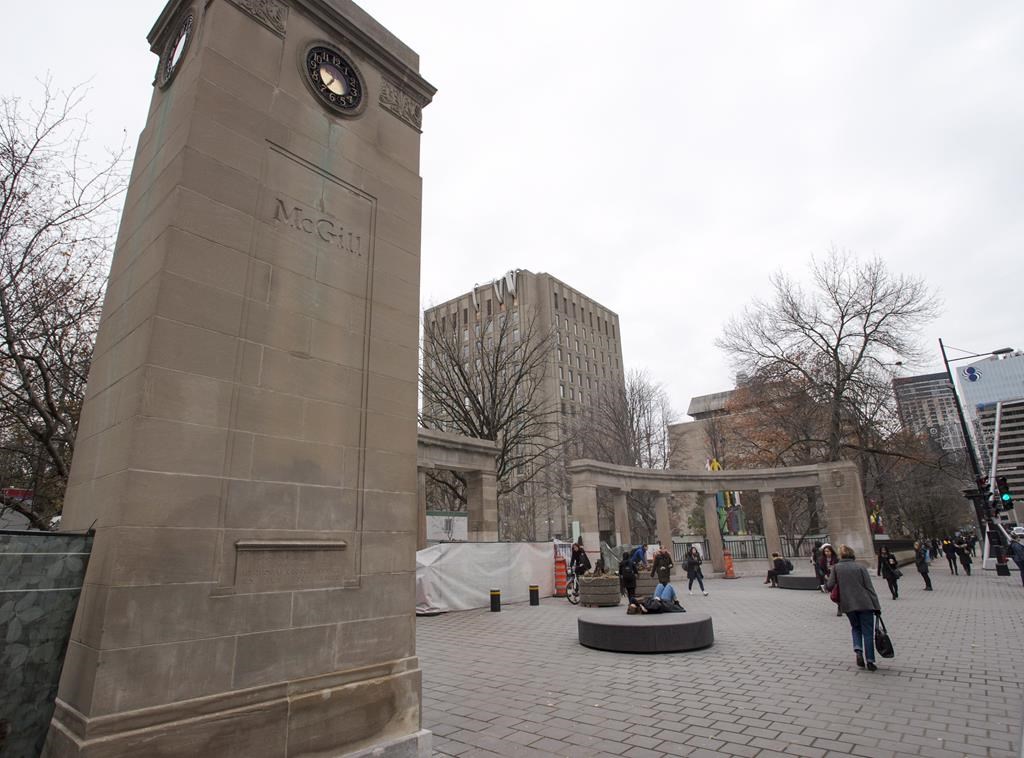McGill University said Tuesday it will begin discussions with an Indigenous group that has raised concerns about unmarked graves after a court ruled that excavation work on a university expansion project would cause “irreparable harm.”

Justice Gregory Moore last week ordered a halt to any excavation at the former site of the Royal Victoria Hospital until the parties hold discussions to develop an archeological plan to search for graves.
“McGill University takes seriously the concerns of Indigenous communities regarding the New Vic project and seeks to better understand how they may be addressed,” Katherine Gombay, a McGill spokesperson, said in an email. She said the university will engage in a conversation with the Indigenous plaintiffs “with humility and in good faith.” The New Vic project is aimed at creating a new research and teaching hub.
The judge also granted Kimberly R. Murray, the federally appointed independent special interlocutor for missing children and unmarked graves, intervener status in the case, and Murray told The Canadian Press Friday that she would take part in meetings with the parties.
In his written decision released Tuesday, Moore said the identification of unmarked Indigenous graves is a priority for discovering the truth and working toward reconciliation. He cited the 2015 Truth and Reconciliation Commission’s recommendations on residential school cemeteries and drew a link to the health-care system.
- Posters promoting ‘Steal From Loblaws Day’ are circulating. How did we get here?
- Canadian food banks are on the brink: ‘This is not a sustainable situation’
- Video shows Ontario police sharing Trudeau’s location with protester, investigation launched
- Solar eclipse eye damage: More than 160 cases reported in Ontario, Quebec
“This call to action is drafted in terms of residential schools, but the plaintiff and the special interlocutor have demonstrated the possible parallels between that system and the health services offered to Indigenous peoples,” Moore wrote.
The injunction was granted Thursday at the end of a two-day hearing, following a request in March from a group of elders from Kahnawake known as the Mohawk Mothers. The group has alleged that the bodies of Indigenous patients of the Allan Memorial Institute and the Royal Victoria Hospital are buried at the site scheduled to be redeveloped.
The Mohawk Mothers claimed to have uncovered evidence of burials through interviews with a survivor of the MK-Ultra mind control experiments conducted in the 1950s and 1960s by Dr. Ewen Cameron at the Allan Memorial Institute on the Royal Victoria grounds.
During the hearing, lawyers representing McGill and the Societe quebecoise des infrastructures, a provincial body that supports public infrastructure projects, argued that there was no evidence of unmarked graves on the site. “Beyond what I consider to be the very firmly held convictions of the plaintiffs, there’s actually very little evidence to support their assertion that there would be graves on the site of the Royal Victoria Hospital,” McGill lawyer Doug Mitchell said.
However, in his ruling, the judge referred to a 2016 archeological report prepared for McGill and the infrastructure corporation that suggested Mount Royal was used as a burial site before the arrival of Europeans. The former hospital is on the side of Mount Royal.
Moore said the plaintiffs would “suffer irreparable harm if the excavation work is not suspended for the time it takes to develop an appropriate archeological plan to identify any unmarked graves.” He noted that there is no evidence the project would be delayed by the suspension since the construction timetable has not been established.
The ruling concludes that there is urgency to respond to the plaintiffs’ “legitimate concerns” about unmarked graves. “Otherwise, the plaintiffs and those who share their concerns will continue to face the trauma that comes from not knowing whether, when, or how their community members’ graves might be disturbed,” the judge wrote.
Julian Falconer, the lawyer representing Murray, called Moore’s ruling groundbreaking and said it was tremendously important for Indigenous Peoples that truth and reconciliation were at the heart of his decision.
Murray’s affidavit provides the court with recommendations on best practices for undertaking a search for unmarked graves.
“The judge has directed that deep dialogue occurs outside of the court, but also as part of the case management process. He also accepted that the information offered by the special interlocutor could be helpful,” Falconer said.






Comments